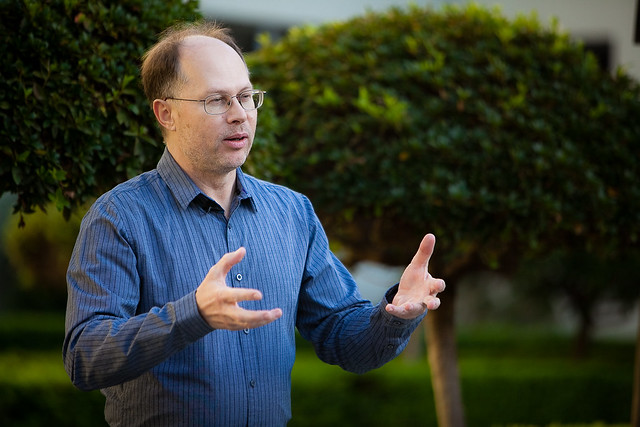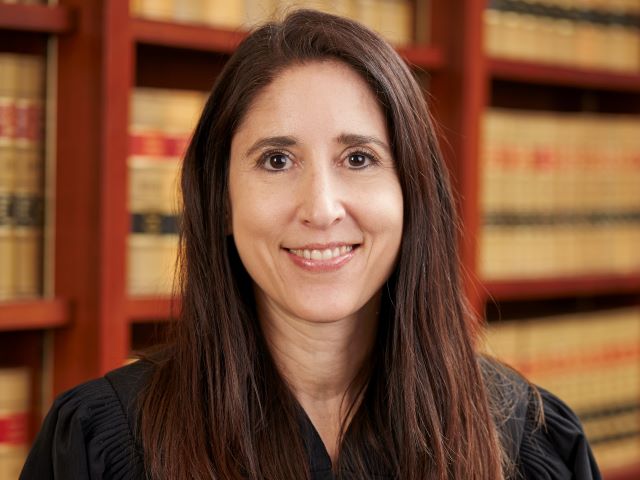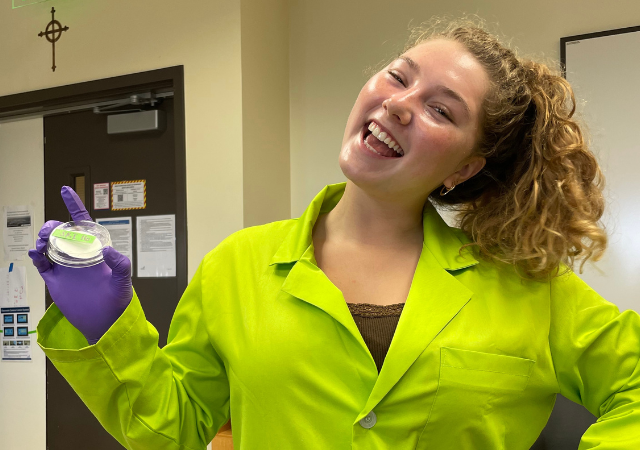Professor Serbin Invited to Vatican to Meet Pope Francis
WATCH: Recording of the Pope's audience to those suffering from Huntington's disease and their families
Watch a video recording of the event that took place at the Vatican on May 18, 2017. Professor Serbin can be seen meeting Pope Francis at the 34:00 mark. You can click the link to watch on YouTube, or scroll down to the bottom of this article for the embedded video.
See a transcript of the pope's remarks on the Vatican website.
Being granted an audience with the Pope is an accomplishment few people ever realize. It’s an honor, a privilege and a religious experience. And up until now, an experience that has never been granted to those suffering from or caring for those with the devastating neurological disorder known as Huntington’s disease (HD).
Earlier this year, the Vatican extended an invitation to 50 special guests to meet Pope Francis personally during a public audience on May 18. The meeting will bring together HD patients, their family members, scientists and advocates in a Vatican auditorium that seats 7,000 people. The organizers expect the audience to be the largest meeting of HD families in history. Among the select few who will actually meet the pope up front will be USD History Professor Kenneth P. Serbin, Ph.D. He will bring his wife and daughter. Serbin’s fields of academic focus are Brazil, the history of the Catholic Church, and the history of science, technology and medicine. His courses range from Modern Latin America to one that is currently in the making, A History of the Brain.
Dr. Serbin describes the disease by its triad of symptoms: physical (involuntary movements), cognitive (loss of ability to speak and reason), and psychiatric (depression and behavioral and mood disorders). The onset of symptoms usually starts in the prime of life, and eventually requires a level of caregiving that requires many HD family members to quit or change their jobs, in order to provide proper care to their loved ones. “There is no effective treatment. There are drugs, but none of the approved drugs do anything to stop the progression of the disease or the root cause, which is the genetic defect,” Serbin states. As an HD patient advocate of over 20 years, Serbin has been working with the community to raise awareness about HD and to “end the shame of this disease.”
Serbin is widely known throughout the HD community by his pseudonym Gene Veritas, a name that means “the truth in my genes.” Serbin, as Gene Veritas, writes a popular HD blog, “At Risk for Huntington’s Disease,” which has proven to be invaluable to the HD community, and has expanded into a discussion of HD science, and the search for a treatment. Gene Veritas started his blog in 2005, and with the help of friends and the community, has written over 240 articles “to share my feelings about HD, but in an anonymous way” at first, explains Serbin. Serbin’s mother died in 2006 after a long struggle with the disease. Serbin, who tested positive for the HD gene in 1999, is a powerful and committed advocate for HD patients, the scientists working to find a treatment, and for those who love and care for HD patients. Serbin went public with his story in 2012, in part because of the passage in 2008 of the Genetic Information Nondiscrimination Act.
Serbin finds the upcoming meeting at the Vatican to be especially exciting due to the fact that the Catholic Church’s first Latin American pope, Pope Francis, is from Argentina, a country that, like many of its neighbors, has been unable to shed the stigma of HD. “In Latin America, where the economies of these countries are not as robust as our economy in the United States, it’s an especially large [caregiving] burden for families,” Serbin says. “The social security and hospital infrastructures are not as good. And overall the scientific and medical infrastructure leaves a lot to be desired. They face a lot of extra challenges, and there are many pockets of HD patients in Latin America who, for decades, have lived in poverty because they can’t get out of the cycle of the disease combined with poverty.”
Pope Francis has invited prominent members of the HD community including scientists such as Italian Senator for Life Elena Cattaneo, Ph.D., Argentine researcher Claudia Perandones, M.D., Ph.D., and British HD advocate Charles Sabine. They will join Serbin, as well as other organizations including Factor-H and the Huntington’s Disease Society for America, as participants in the papal audience. The goal of the meeting is to erase the shame and stigma associated with HD. In Rome, Dr. Serbin also wants to point out the importance of caregivers within the HD community.
Huntington's disease affects around 30,000 in the U.S. and a million worldwide, with 10 percent being teenagers and children suffering from the juvenile form of the disorder. The need to bring HD and other rare diseases into the public eyes is crucial, and cannot be done without the help and support of others. The audience with Pope Francis will show the HD community, and those unfamiliar with the disease, the importance of giving hope to these patients, and allowing them to be “Hidden No More.”
— Abigail Lombardo ’17




